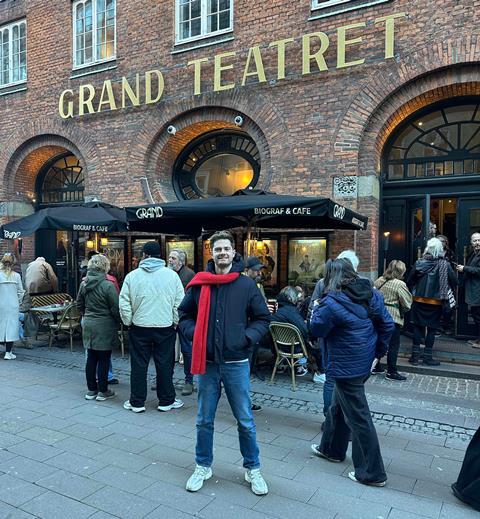The Danish Cinema Club’s support can make or break a film’s release. Screen reports on how the Danes found a way to co-operate for the benefit of cinemagoing culture.

Lukas Dhont’s Belgian drama Close sold more than 125,000 tickets in Denmark. Not simply because it is a well-realised, Oscar-nominated film, but because it had the benefit of selection by the hugely influential Biografklub Danmark (Danish Cinema Club).
“Without the club’s selection, Close would have sold maybe 20,000 to 25,000 tickets,” estimates Kim Foss, managing director of distributor Camera Film. No wonder he says that “getting a film selected in the club is like winning the lottery as an arthouse distributor”.
So what is this magical golden ticket? Well, it is actually 10 half‑price tickets for devoted moviegoers. Danish Cinema Club boasts nearly 250,000 members, aged 18-90, across all of Denmark, who pay €17 ($18.50) per year and in return can see a curated programme of 10 films at half price in any Danish cinema.
The club’s curation can make or break a film, especially a smaller title. The selection committee of four exhibitors and three distributors changes every two years; it makes its choices based on which films have been submitted by distributors. There are always a mix of bigger studio titles (such as The Color Purple and A Star Is Born), European and pan-Nordic titles, and local productions.
Lina Flint, producer of Gustav Möller’s 2018 low-budget debut The Guilty, recalls the film’s selection alongside larger titles such as Three Billboards Outside Ebbing, Missouri. “The Guilty is a challenging, low‑budget, high-concept debut film that the distributors liked, but to be honest nobody could imagine how the market and the broad audience would react. [The selection] forced distribution to put a large advertising campaign behind the film. Suddenly [it] was taken seriously also as a potential commercial film.” The Guilty reached more than 140,000 admissions.
Release dates for the 10 titles are “never at the same time as the big holidays or other popular release dates in the business… making sure the Danish Cinema Club audience automatically goes to the cinema [during] the less busy periods,” explains Lykke Lind Thomsen, director of the club.
Danes visit the cinema on average 1.7 times per year. Danish Cinema Club members on average see five of the chosen 10 films. Surveys also suggest they go an additional three times outside of the club programme.
Target market
Danish Cinema Club started nearly 30 years ago as a cross-industry initiative to get middle-aged and older audiences back into cinemas. Even today, the majority of members are over 50.
The membership understandably declined slightly during the pandemic but is now back up to its healthy levels. “Everyone thought the 60-plus generation would be most afraid of going out after the pandemic,” says Thomsen. “We saw the exact opposite. The eldest of our members were the first and most frequent audience to return to the cinema. They missed their local cinema groups and missed going out.
“The club is a great success in Denmark because of two things,” she adds. “It’s a collaboration between all parts of the business [distribution, exhibition, producers’ association and the Danish Film Institute] and because of the special community — the members organise themselves locally in smaller clubs, communities, cultural clubs, food nights, etc.”
Thomsen says other countries should consider the model if they are able to get all the relevant parties on board, stressing the importance of “flexibility” (all cinemas redeem the vouchers) and “convenience” (vouchers can be used every day and for all showtimes). Norway has had its own model since 2016 and Sweden since 2021.
Camera Film’s Foss has served on the selection committee. “When you sit down together and do the curation, you have to behave as good colleagues and not competitors,” he says. “That’s how we’ve made it work in Denmark. All the stakeholders act in solidarity with the project and the overall idea behind it.”
Foss, who is also an exhibitor running Copenhagen’s six‑screen Grand Teatret, accepts that grosses will go down for half-price club tickets. “It’s part of the game,” he says. “The upside is that we get extremely loyal customers, who appreciate our no-popcorn policy and hit the chardonnay and coffee. It brings extra life to your cinema and — as we all know — there is something beautiful in that critical mass.”
Read more:
-
How continental exhibitors are getting creative to boost audiences
-
France is embracing new hit-making strategies
-
Italy’s exhibitor association CEO on the country’s cinema landscape
-
How Spain’s Cine Seniors scheme is luring back older audiences
-
Yorck Cinema Group head Christian Brauer on Germany’s arthouse recovery







![The Brightest SunScreen[Courtesy HKIFF]](https://d1nslcd7m2225b.cloudfront.net/Pictures/274x183/3/5/0/1448350_thebrightestsunscreencourtesyhkiff_312678.jpg)

















No comments yet